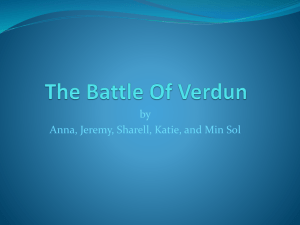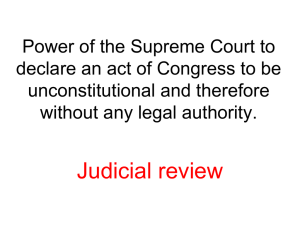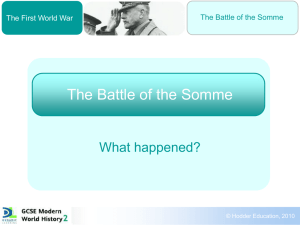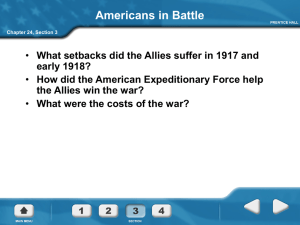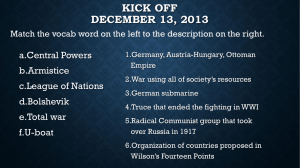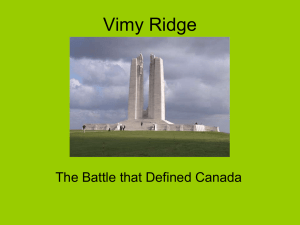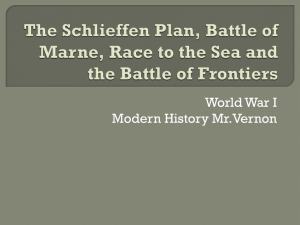War at Sea (1914-1918)
advertisement
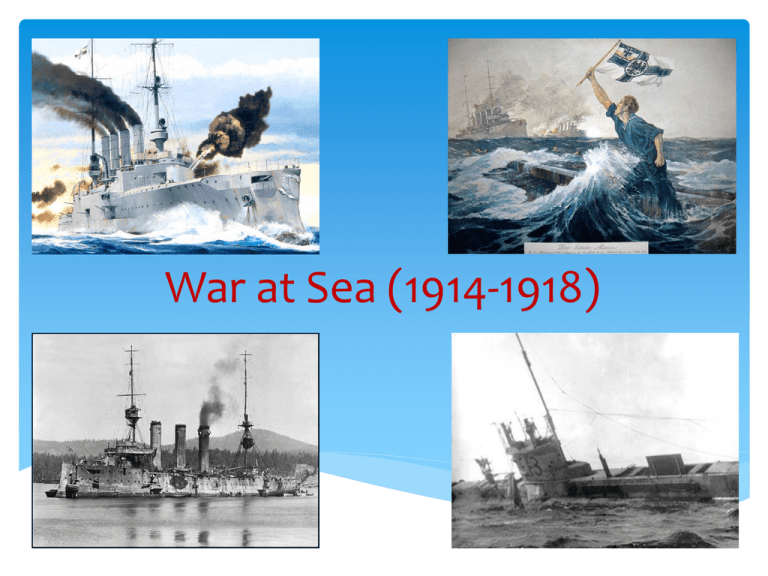
War at Sea (1914-1918) The Battle of Heligoland Bight 28th august 1914=Opening of battle First naval war Designed by British to attack German patrols in north-west German Coast Heligoland= German base British Commander Tyrwhitt in charge of operation Aided from Vice Admiral Beatty 28th August 7a.m. = Tyrwhitt sinks two German torpedo boats Germans not unprepared; deployed two ships, The Frauenlob and The Stettin, shortly after four light cruisers joined, incl. Rear Admiral Mass’s flagship Köln Tyrwhitt had come to be in a tight spot, called assitance of Beatty at 11:45a.m Arrived at 12:40p.m Sunk Mainz, Köln and Ariadne, damaging three other crusiers Germans lost 1,200 men wheras britsh only suffered 35 deaths Battle of Coronel Battle opened 1st November 1914 Coronel = Central Coast of Chile British became aware of it after the arrival of the news that Admiral Sir Christopher Cradock’s squadron was completely destroyed Cradock’s fleet= not modern, not strong = no Chance against Admiral Spee’s five vessels – all modern and efficient Outnumbered Cradock sends for reinforcements; these don’t arrive in time: battle unexpectedly started on 1st November Humiliated by the defeat, British swiftly assembled a large naval force to destroy Spee’s force Lead by Sir Frederick Sturdee The Battle of the Falkland Islands -Admiral von Spee doesn’t expect a British counterattack British, however have been sent to avenge the British defeat at the battle of Coronel Germans : Scharnhorst and Gneisenau and Cruisers British : Invincible and Inflexible were accompanied at Port Stanley by six other cruisers, all under the command of Vice Admiral Sturdee ; armored cruisers Canarvon, Cornwall and Kent; two light cruisers, Bristol and Glasgow; and an old vessel, Canopus, (presently grounded at Port Stanley and used as a form of makeshift fortress.) Wanting to refuel, Spee began attack on 8th Dec. 1918 - Aware of Port Stanley having shipping, Spee mistakenly Thought that the ships were Japanese Germans = Tired and exhausted, British = Opposite Germans = Outgunned, realized the danger far to late , tried to evade British by hurriedly evacuating into open sea , At 10 am pursued by British Fleet, at ca. 13.20 pm Spee see’s no other way than fighting, Germans success in striking Invincible, 40 mins later Sturdee brings his ships in firing range, Four German cruisers were sunk, with Spee's flagship Scharnhorst sinking rapidly first, followed by Gneisenau, Nurnberg and Leipzig. 10 British sailors killed, no ship badly damaged , Germans lost 2,200 men (drowned or killed), only German ship to survive = Dresden = 3 months later surrendered off the Juan Fernandez Islands (14th March) The Battle of the Falkland Islands ended German Raids on Sea and became a tremendous morale booster of the British The Raid on Scarborough and Hartelpool Approx. 8:10 am, 16th September 1914 Admiral Franz von Hipper bombards Northsea English Seaports Hartlepool, Scarborough and Whitby Ended approx at 9:30 causing 137 deaths and 592 injured Royal navy dispatch with a fleet of 6 battleships, 4 battle cruisers, 4 heavy cruisers, 6 light cruisers and 8 submarines due to warning of Naval Intelligence crew Germans raided with 5 battle cruisers, (?) light cruisers and (?) destroyers Raid almost failed, Von Hipper only managed to survive due to British signaling mistakes, British became large clamour The Battle of Dogger Bank 24 January 1915 Result of the Raids on Scarborough, Hartlepool and Whitby Admiral Von Hipper wanted to “re-live” the raids but British interception stopped him British used a stolen German code-book to decode an interception of German radio traffic British first sunk Bucher, killed 782 and captured the act on film Sunk the flagship Seydlitz, killed 192 Not a battle of importance, was another morale booster for British navy The Battle of Jutland Opened 31 may 1916 Greatest naval battle of the WWI Commander of German High seas fleet, Reinhard Scheer (recently appointed), confident of codes being secure and decided to return to raids on the British coast Battle split into 5 main phases No aircraft or submarines used, although planned The Battle of Otranto Straits Austro-Hungarian Navy attack Launched in the night of 14/15 May 1917 Austro-Hungarian initiative began with an attack against an Italian munitions ship and its accompanying destroyer, sinking both. The three cruisers proceeded to sail along the Otranto Barrage at 3.30am sinking fourteen Allied patrol craft in the space of two hours Allies try to stop Austro-Hungarian attack; fail and A-H Navy able to flee A-H supported by Germans; including the Submarine U-25 which severely damages Dartmouth along with its accompanying destroyer Consequence : Italians left the Otranto Barrages with the reasoning that they were indefensible The Battle of Zeebrugge Launched 23 April 1918 Plan to neutralize Belgian ports of Zeebrugge and Ostend; both used by Germans as a base for submarines and light shipping Planned in secret Main force was to be at Zeebrugge, smaller force at Ostend Began badly, because the diversion of smoke was interrupted by unexpected winds, and therefore failed Raid on Zeebrugge produced unclear results; almost none whereas the smaller force in Ostend failed totally Bibliography http://www.bgs.ac.uk/falklands-oil/images/environ/1914battle.jpg http://www.firstworldwar.com/battles/sea.htm http://www.gwpda.org/photos/coppermine/thumbnails.php?album=3 http://www.firstworldwar.com/timeline/1914.htm http://www.vlib.us/medical/hanks/gfleet.gif http://www.bbc.co.uk/history/worldwars/wwone/images/gal_sea_lusitania.jpg http://www.gutenberg.org/files/15479/15479-h/images/image10.png http://farm3.static.flickr.com/2071/2143039507_df579c8baf_o.jpg http://www.firstworldwar.com/maps/graphics/maps_14_naval_ops1914_%281600%29.jpg http://www.groteoorlog.be/gotzen/letzte.jpg http://www.military-art.com/mall/images/dhm1251.jpg http://www.navy.forces.gc.ca/project_pride/all_images/photo_archive_images/Large/E-38800.jpg http://www.schoolshistory.org.uk/Year9/firstworldwar/Pictures/hms_invincible_december1914.jpg http://www.warchat.org/pictures/world_war_i_1914-1918_british_submarine.jpg http://techcenter.davidson.k12.nc.us/Group9/seawar.htm http://www.naval-history.net/NAVAL1982FALKLANDS.htm http://longstreet.typepad.com/.a/6a00d83542d51e69e20120a9731f1c970b-800wi http://www.gwpda.org/naval/jmap02l.jpg http://www.learningcurve.gov.uk/images/death-at-sea/jutland1916.jpg http://www.vlib.us/medical/hanks/gfleet.gif http://www.vlib.us/medical/hanks/Bfleet.gif
